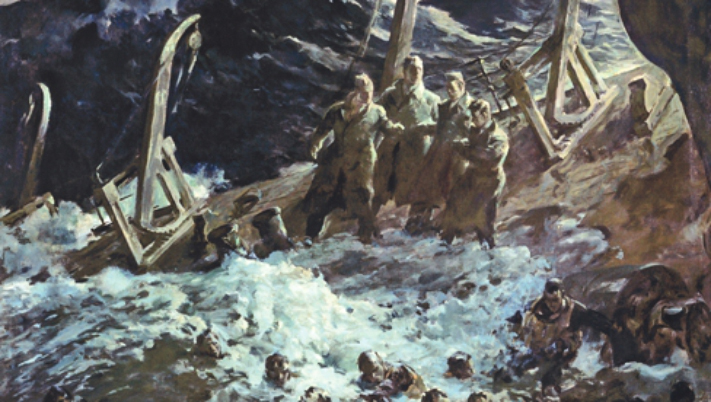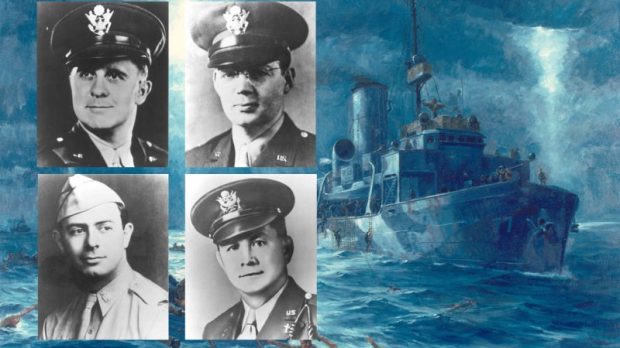For some of the survivors of a World War II transport ship that sank in the North Atlantic, the last sight they had of the rabbi, Catholic priest and two Protestant ministers on board was of the clergymen linking arms and offering prayers as the vessel went down.

Today, February 3, is the 74th anniversary of the sinking of the American military transport ship Dorchester, attacked by a Nazi U-boat 80 miles south of Greenland. Among the 902 men being transported to a base there were Rabbi Alexander D. Goode; Father John P. Washington, a Catholic priest; Rev. George L. Fox, a Methodist minister and Rev. Clark V. Poling, a Dutch Reformed minister. Their heroism in tending to the injured and the frightened in an incident that claimed 672 lives led to the chaplains’ being memorialized in books, documentaries, stained glass windows and a postage stamp. In 1988, Congress designated February 3 as Four Chaplains Day.
“Witnesses of that terrible night remember hearing the four men offer prayers for the dying and encouragement for those who would live,” said Fox’s son, Wyatt R. Fox, according to the Four Chaplains Foundation.
One witness, Private William B. Bednar, found himself floating in oil-smeared water surrounded by dead bodies and debris in the wake of the torpedo attack. “I could hear men crying, pleading, praying,” Bednar recalled. “I could also hear the chaplains preaching courage. Their voices were the only thing that kept me going.”
When there were no more lifejackets in the storage room, the chaplains removed theirs and gave them to four frightened young men. … As the ship went down, survivors in nearby rafts could see the four chaplains—arms linked and braced against the slanting deck. Their voices could also be heard offering prayers.
Petty Officer John J. Mahoney recalled Rabbi Goode giving him his gloves, trying to dissuade him from going back into his cabin and rather to try to save himself. Goode told him he had an extra pair, but Mahoney later realized that he probably didn’t, that the rabbi knew that he was not going to survive the sinking.
Four years ago, on the 70th anniversary of the disaster, the head of the Archdiocese for Military Services, Timothy P. Broglio, offered a Mass at St. Stephen’s Church in Kearny, New Jersey, the last parish served by Father Washington. The priest and his fellow chaplains did not get up that fateful day deciding they were going to be heroes, the archbishop said. “They were men for others with the courage of their convictions long before that day dawned.”

